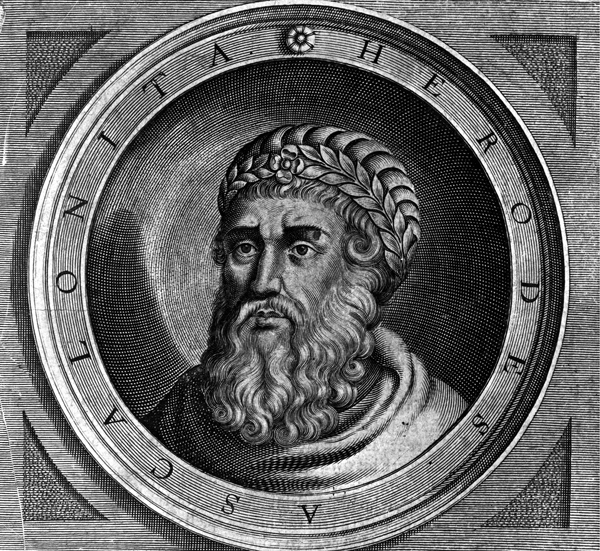Herod the Great (Mark 3)
Herod the Great began his career as military governor of Galilee in 47 B.C. The Roman Senate then appointed him king of Judea in 40 B.C. After violently suppressing a significant opposition from the aristocracy in Jerusalem, he formally began his reign in 37 B.C. and ruled until his death in 4 B.C. Herod’s father, Antipater, was an Idumean convert to Judaism, and his mother, Cypros, was a Nabatean. Herod curried favour with the Jews but was staunchly allied to Rome and embraced Greco-Roman culture and religion. He is known for his extensive building programs; evidence of some of this activity can still be seen today. In this arena, Herod’s accomplishments were impressive and included the following:
- Temples to Roma, Augustus and Baal Shamim; the Pythian temple at Rhodes; and, of course, the Jerusalem temple.
- Palaces at Masada, Jericho, Ascalon and elsewhere.
- Gymnasia, baths, fountains, colonnades, markets and other public buildings throughout the eastern Roman Empire.
- Entire cities, such as Caesarea Maritima and Sebaste.
Herod’s rise to power came about during a tumultuous period in Roman history – the civil wars of the First and Second Triumvirates. Herod often backed the losing side; for example, he was on the side of Anthony and Cleopatra when they were at war with and finally defeated by Octavian (later known as Caesar Augustus). Nevertheless, Herod had remarkable political instincts and was able to save his life and power by quickly submitting and swearing allegiance to Octavian. Indeed, every move he made was designed in some way to ensure that he eliminated his enemies and held on to the support of the people who mattered. For example, Herod divorced his first wife, Doris, and became engaged to Mariamne, granddaughter of the high priest Hyrcanus II (Herod ultimately executed both of them).
His tenuous hold on power – a single misstep and he could have lost everything – may have contributed to the paranoia that led him to execute so many, including his own children. Jesus was born during the reign of Herod (Matthew 2:1), who, near the end of his life, gained eternal infamy by having the baby boys of Bethlehem put to death (Matthew 2:16). Caesar Augustus is reported to have once made the pun that he would rather be Herod’s pig (in Greek ‘hus’) than his son (‘huios‘), a reference to the fact that as a nominal Jew Herod at least had scruples about killing pigs – if none about executing his own family members.
The holy family fled to Egypt to escape Herod’s wrath (Matthew 2:13-14). While they were there Herod died of disease in his palace at Jericho, which has been excavated. His body was carried in an elaborate procession to Herodium near Bethlehem where he was interred with splendour. In spite of extensive excavations at Herodium, Herod’s tomb has never been located.
Herod’s kingdom was divided among three of his four surviving sons: Archelaus, ruler of Judea ans Samaria (Matthew 2:2); Herod Antipas, tetrarch of Galilee and Perea (Matthew 14:1-10); and Philip II, tetrarch of Iturea and Trachonitis (Luke 3:1). Other members of Herod’s extensive family (he had ten wives) are mentioned in the New Testament; a fourth son, Philip I (Matthew 14:3-11, Mark 6:17-28, Luke 3:19); a granddaughter Herodias, who married two of his sons (her uncles); a grandson Herod Agrippa (Acts 12:1-23, 23:35); a great-grandson Agrippa II (Acts 25:13-26:32); great-granddaughters Bernice (Acts 25:13-27, 26:30), Drusilla (Acts 24:24) and Salome (Matthew 14:6-11, Mark 6:22-28).
—
